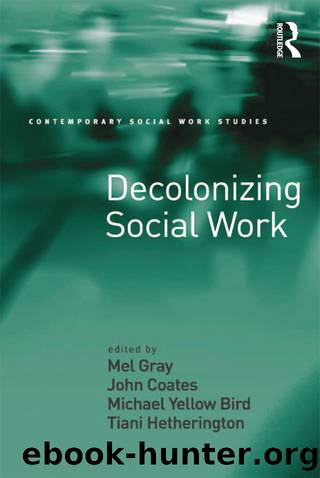Decolonizing Social Work by John Coates Tiani Hetherington Mel Gray

Author:John Coates, Tiani Hetherington, Mel Gray [John Coates, Tiani Hetherington, Mel Gray]
Language: eng
Format: epub
Tags: Social Science, Social Work
ISBN: 9781409472780
Google: -XTvndQwfngC
Publisher: Ashgate Publishing, Ltd.
Published: 2013-07-28T04:07:00+00:00
The Cultural Context and âInformalityâ within Jordanian Society
The modern state of Jordan is located in a strategic position in the Middle East sharing borders with Syria, Iraq, Saudi Arabia, Israel and Palestine (National Population Committee, 2000) and covering an area of approximately 88,778 sq km. Jordan is a low to middle income country, although economic indicators show it fares better than most other countries in this income category with a reliance on income from tourism, agriculture and service industries (Al-Makhamreh and Lewando-Hundt, 2011; Ibrahim, 2010). The Hashemite Kingdom of Jordan is a constitutional monarchy headed by King Abdullah II and enjoys a relatively free political environment. The Prime Minister and Central Cabinet oversee a variety of ministries, including national defence, education, social welfare and infrastructure development (Robbins, 2004). According to the countryâs constitution, all citizens have equal rights and duties regardless of their religious or tribal affiliation (Droeber, 2003).
The majority of Jordanâs 5,230,000 citizens are Sunni Muslim with a very small Shia minority. Christians comprise 5â8 per cent of the population and there are smaller numbers from religious groups such as Druze and Bahais. In terms of non-Arab populations, there are small numbers of people originating elsewhere, including Circassians, Chechens, Armenians and Kurds. These minority groups incorporate some of the cultural attributes of the wider society (Bureau of Near Eastern Affairs, 2004; Department of Statistics, 2007; Sheikh and Gatrad, 2000). As previously mentioned, all Jordanian citizens have equal rights and duties regardless of their religious affiliation (Droeber, 2003). Freedom of religion is vital in Jordan and still plays a major part in influencing and organizing social and political life (Higher Council for Science and Technology General Secretariat, 2001; Sheikh and Gatrad, 2000).
In Jordanian society, as in many Arab societies, people are typically characterized as town dwellers (madanein), villagers (fellahein) or Bedouin desert dwellers (badow). The vast majority of Jordanians are settled in large urban areas, including Amman, the capital.
Familiar in popular culture, the Bedouin comprise only 5 per cent of the Jordanian population. The Badia (the root bada meaning âto be clearâ, âcome to lightâ) is the place where the Bedu live and is the name commonly given to the arid lands of the Middle East (Al-Makhamreh, Hasna and Al-Khateeb, 2011). The number of Bedu living in the Badia has sharply declined since the introduction of the new Ottoman land laws in the mid eighteenth century, which abolished communal ownership of the land that was a basic component of their nomadic lifestyle (Al-Smairan, 2006). Although primarily nomadic in the past, they are now relatively settled in small villages and employed in waged labour, the army and teaching (Hasna et al., 2010). Bedu society is based on tribal organization characterized by collectivism and loyalty to family, clan and tribe (Al-Makhamreh, Hasna et al., 2011). Their community structure is based on tribes (asheirah), subdivided into clans of extended families (hamoulah), which are then divided into principal families (fakhd) (Dutton and Shahbaz, 2008).
The structured divisions of family remains significant throughout Jordan given Arabs, in general, are descendants from various tribes that migrated throughout the centuries.
Download
This site does not store any files on its server. We only index and link to content provided by other sites. Please contact the content providers to delete copyright contents if any and email us, we'll remove relevant links or contents immediately.
Chaco's Northern Prodigies : Salmon, Aztec, and the Ascendancy of the Middle San Juan Region after AD 1100 by Paul F. Reed(379)
Digital International Relations by Unknown(375)
Law Enforcement Interpersonal Communication and Conflict Management by Brian Douglas Fitch(365)
Skilled interpersonal communication: Research, theory and practice, Fifth edition by Owen Hargie(355)
The Enduring Color Line in U.S. Athletics by Krystal Beamon Chris M. Messer(353)
Critical Perspectives on Human Security : Rethinking Emancipation and Power in International Relations by David Chandler; Nik Hynek(341)
EPSO CAST Political affairs EU policies: How to succeed in the selection procedure by Franco Reverte José María(328)
Evidence-Based Policy Making in Labor Economics by Hamermesh Daniel S.;Nottmeyer Olga K.;Nottmeyer Olga;King Sarah;King Sarah;King Sarah;(319)
Writing Public Policy - A Practical Guide to Communicating in the Policy Making Process by Catherine F. Smith(297)
Criminological Theory in Context by John Martyn Chamberlain(294)
Rothschild and Early Jewish Colonization in Palestine (Geographical Perspectives on the Human Past) by Ran Aaronsohn(292)
Positive Psychology and Spirituality in Counselling and Psychotherapy (Conflict, Ethics, and Spirituality, 12) by unknow(289)
Tibeton Yoga Its Secret Doc by Evans-Wentz(283)
Threshold Concepts in Women's and Gender Studies by Christie Launius Holly Hassel(279)
Social Problems, Social Issues, Social Science by James Wright(276)
Cognitive Development in Infancy and Childhood (Elements in Child Development) by Mary Gauvain(273)
Play in child development and psychotherapy: toward empirically supported practice by Sandra W. Russ(272)
Latin American Politics and Society by Gerardo L. Munck & Juan Pablo Luna(252)
The Arab Spring Abroad: Diaspora Activism against Authoritarian Regimes by Dana M. Moss(234)
